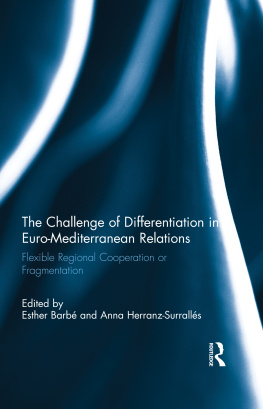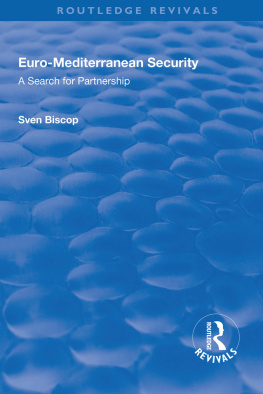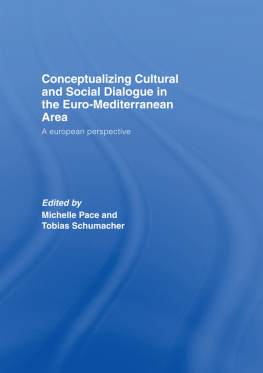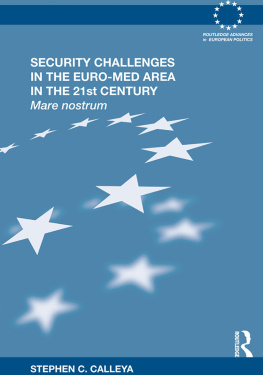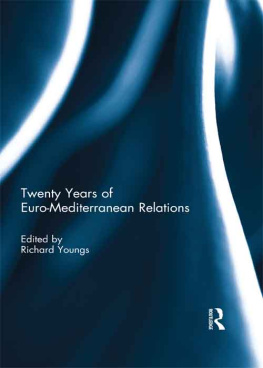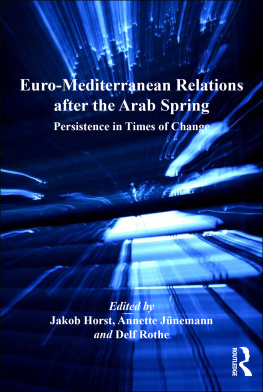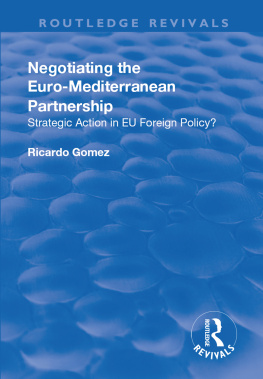The Challenge of Differentiation in Euro-Mediterranean Relations
The tension between the aim of creating sustainable multilateral region-building dynamics and the need to find more differentiated and flexible forms of cooperation has been ever-present in Euro-Mediterranean relations. The proliferation of different and partially overlapping initiatives in recent years the Euro-Mediterranean Partnership, the European Neighbourhood Policy and the Union for the Mediterranean is a plain expression of this tension. The 2011 episodes of regime-change in the Arab world have once again placed the debate about differentiation in EUs relations with Southern and Eastern Mediterranean Countries at the top of the Unions foreign policy agenda.
This book contributes to theoretical and practical debates on whether differentiation processes can aid or hinder convergence processes and region-building efforts more widely. The contributions to this collection assess the actual significance and consequences of differentiation in Euro-Mediterranean relations through sector-specific in-depth analyses, covering issue areas as varied as environmental policy, migration, foreign and defence policy, trade, energy, civil protection and democracy promotion. The particular angle and comprehensive analysis of this book will make it of great interest for both scholars and policy makers alike in a moment when Euro-Mediterranean are in need of a thorough rethink.
This book is based on a special issue of Mediterranean Politics.
Esther Barb is Professor of International Relations at the Autonomous University of Barcelona (UAB) and Coordinator of the Program Security, Power and Multilateralism in a Global World of the Institut Barcelona dEstudis Internacionals (IBEI). She has extensively published on European foreign policy, especially Euro-Mediterranean relations, and on Spanish foreign and European policy.
Anna Herranz-Surralls is Juan de la Cierva researcher at the Institut Barcelona dEstudis Internacionals (IBEI). Her research has dealt with EU enlargement and European Neighbourhood Policy, the external dimension of EUs energy policy, and the parliamentary dimension of European foreign policy.
The Challenge of Differentiation in Euro-Mediterranean Relations
Flexible Regional Cooperation or Fragmentation
Edited by
Esther Barb and Anna Herranz-Surralls
First published 2012
by Routledge
2 Park Square, Milton Park, Abingdon, Oxon, OX14 4RN
Simultaneously published in the USA and Canada
by Routledge
711 Third Avenue, New York, NY 10017
Routledge is an imprint of the Taylor & Francis Group, an informa business
2012 Taylor & Francis
This book is a reproduction of Mediterranean Politics, vol. 15, issue 2. The Publisher requests to those authors who may be citing this book to state, also, the bibliographical details of the special issue on which the book was based.
All rights reserved. No part of this book may be reprinted or reproduced or utilised in any form or by any electronic, mechanical, or other means, now known or hereafter invented, including photocopying and recording, or in any information storage or retrieval system, without permission in writing from the publishers.
Trademark notice: Product or corporate names may be trademarks or registered trademarks, and are used only for identification and explanation without intent to infringe.
British Library Cataloguing in Publication Data
A catalogue record for this book is available from the British Library
ISBN13: 978-0-415-69955-6
Typeset in Times New Roman
by Saxon Graphics Ltd, Derby
Publishers Note
The publisher would like to make readers aware that the chapters in this book may be referred to as articles as they are identical to the articles published in the special issue. The publisher accepts responsibility for any inconsistencies that may have arisen in the course of preparing this volume for print.
Contents
Esther Barb and Anna Herranz-Surralls
Oriol Costa
Niklas Bremberg
Frdric Misrahi
Gonzalo Escribano
Eduard Soler i Lecha
Daniel Wunderlich
Tobias Schumacher
ESTHER BARB and ANNA HERRANZ-SURRALLS
The 2011 episodes of regime change in the Arab world obliged the EU once more to reassess its Mediterranean policy. This time, the need for a novel approach came less from the EUs disillusionment with the pace of political and economic reforms in the southern Mediterranean countries, and more from its sense of failure and embarrassment for not having appropriately gauged and contributed to the winds of democratic change in this area. It is in this sense that the Commissioner for Enlargement and European Neighbourhood Policy bluntly affirmed, after the ousting of the Tunisian and Egyptian presidents, Zine El Abidine Ben Ali and Hosni Mubarak, in early 2011, that Europe was not vocal enough in defending human rights and local democratic forces in the region. Too many of us fell prey to the assumption that authoritarian regimes were a guarantee of stability in the region (Fle 2011: 2). In order to redress former policy flaws and rise to the challenge of the history-making events in the Arab world, the European Commission called for a new approach to Euro-Mediterranean relations based on more differentiation, encapsulated in the motto more for more, or the promise of greater support from the EU to those countries going further and faster with reforms (European Commission, 2011a: 5).
The idea of differentiation in Euro-Mediterranean relations is certainly not new. This concept did not figure prominently in the initial design of the Euro-Mediterranean Partnership instituted in 1995, the first truly multilateral and comprehensive project to channel relations between the EU and southern Mediterranean countries. However, the obstacles, which soon plagued this ambitious region-wide endeavour, compelled the EU to look for flexibility mechanisms enabling cooperation with those partners and issue areas in which progress was possible. In this way, differentiation has been entrenched in subsequent EU initiatives for the region, most notably in the European Neighbourhood Policy (ENP) launched in 2004 which embraced bilateral differentiation as one of its guiding principles; and more recently in the Union for the Mediterranean (UfM), conceived as a mechanism to boost more flexible cooperation around specific and technical-oriented projects.
This trend towards greater differentiation in Euro-Mediterranean relations has not moved forward without debate. On the contrary, experts have recurrently discussed whether a less regional and holistic approach is a welcome pragmatic development or is rather a sign of fragmentation and an obstacle to more ambitious region-building projects. However, despite many insights into the advantages and disadvantages of differentiation, compared to region-wide and comprehensive approaches to Euro-Mediterranean relations, this topic has not been tackled in a structured manner in the literature. The debate regarding the pros and cons of differentiation has mostly been addressed (often only in an implicit manner) when assessing overall institutional frameworks for relations between the EU and the Southern and Eastern Mediterranean Countries (SEMC).1 Conversely, there has been less focus on taking the debate to a more concrete level and assessing the effects and implications of differentiation dynamics on cooperation in particular issue areas.


